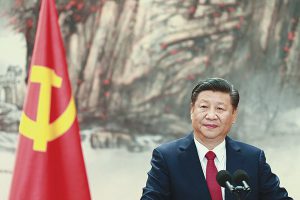If tech billionaires were targeted by China’s rulers last year, it looks like the millionaire civil servants are next.
“Zero Tolerance,†a new five-part documentary jointly produced by CCTV and the Central Commission for Discipline Inspection, the powerful anti-corruption agency, signals just that. In the nine months ending September, CCDI opened about 407,000 cases and punished 438,000 people, the most since disclosures of such figures began in 2017, the watchdog said.
It makes for compelling reality television. Officials currently behind bars are featured, talking vividly and almost cheerfully about what they did, as if they were just having a heart-to-heart with a friend at a coffee shop. There was nothing lighthearted about their crimes, however. Hu Huaibang, former boss at China Development Bank, is serving a life sentence for bribery. The day after his episode aired, Wang Fuyu, a retired top official from
impoverished Guizhou province, received a death penalty for taking in 434 million yuan.
As Xi enters his third five-year term, he is relying ever more on his civil servants to keep the economy going. After last year’s crackdown, private businesses that arguably had provided public services are now in retreat, leaving governments to pick up the slack. The public sector will start to provide its own cloud services, build urban redevelopment projects and maintain sewage systems, just to name a few.
Consider China’s troubled real estate sector. Bruised by defaults from the likes of China Evergrande, local governments are now responsible for realising Xi’s mantra that “housing should be for living in, not for speculation.â€
But public housing is in short supply, creating an opportunity for less-than-honest bureaucrats. As of August, more than 16 million units had been built across China, but 65% of its population is considered low-income, or with less than 100,000 yuan in annual household income, according to CLSA. So who gets to move into those coveted flats? As “Zero Tolerance†portrayed, a low-level official addicted demanded bribes in exchange for promised apartments that she did not deliver.
The sprawling financial sector, where state-owned banks, insurers and asset managers dominate, is another pressure point. A survey conducted by China’s judicial courts shows that between 2018 and 2020, illegal lending is the second-most common financial crime, after fraud. Hu, for instance, helped facilitate a $4.8 billion credit line for
an obscure energy trader, whose epic defaults are saddling China’s largest policy bank with billion-dollar write-downs.
Even the Zero Covid policy, now known as “dynamic clearing,†has become decentralised. It is up to local officials to control outbreaks without following Xi’an into a draconian lockdown.
Incentives to cheat and take bribes are inescapable. Faced with a slower economy and fewer land sales, local governments across China are cutting back on perks and year-end bonuses; some public employees saw their monthly pay fall by up to a third.
Perhaps that’s why China’s propaganda machine is starting the year of the tiger with an anti-corruption documentary. Xi knows he needs his work horses to work. But since he can’t pay them, he just has to scare them into action.
—Bloomberg
 The Gulf Time Newspaper One of the finest business newspapers in the UAE brought to you by our professional writers and editors.
The Gulf Time Newspaper One of the finest business newspapers in the UAE brought to you by our professional writers and editors.
